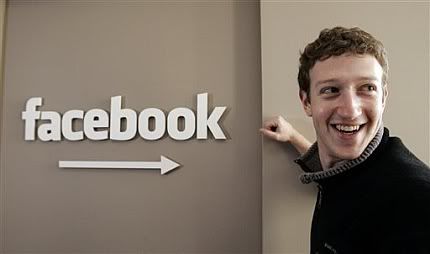| 07.11.08 Facebook Grows Up by Tim Bajarin Has Facebook rewritten the concept of the Internet portal? | ||
 | ||
| Zuckerberg, Facebook founder. | ||
The history of the Internet is a bloody one. The invention of the browser set off a free-for-all, a mad dash to create the Web services, e-commerce, and content that define the information age. Early battles were fought around browsers, especially the legendary fight between Netscape and Microsoft, but the bigger struggle was focused on portals. As AltaVista, Excite, Yahoo!, and others fought to become a user's home page, they blazed the trails of custom content aggregation and were the centers of early Internet advertising. They also gave all of us a common start page, an easy way to begin our Web surfing. Many portal pioneers are still around, but some (like Excite and AltaVista) have lost their place in the market, pushed aside by search giants Google, Yahoo!, and Microsoft, who used their clout to become the start portals for much of the market today. I sense another portal war in the air—and this one is personal. The millennials have already made social-networking sites like MySpace, Facebook, and Bebo their first stop on the World Wide Web. But only recently has it become evident that the next portal war will be around social networking, as the rest of us discover sites like Facebook, LinkedIn, and Plaxo, services that are now taking aim at an older audience. The last two focus on business users, who make up one of the most lucrative markets within social networking. No wonder LinkedIn recently took a new round of venture capital money…and the venture capitalists priced its market value at around $1 billion. People in the upper end of the Gen X and Boomer age groups are linking to friends and family as well as business associates—Facebook isn't just for the kids anymore. What I find most interesting is that social networking for businesspeople gives these older users, who typically interact with coworkers and clients in impersonal ways, a glimpse of the personal lives of these same folks. And more important, the experience is addictive. One of my college professors told me that there is a bit of voyeurism in all of us, and perhaps he was right. Checking out what my friends are doing on Facebook has become a pastime for me. It has also become my direct e-mail link to them; I use the "send a message" feature often to comment on what they have posted. For years, my start page was always Yahoo! or Excite, something that gave me a customized approach to aggregating content that was important to me each time I logged on to the Web. My start page now is Facebook, where I have well over a hundred people I know or have known, including people I had lost touch with who once again have become friends and acquaintances through Facebook. This is relatively impersonal: I don't talk to them, or meet up with them, and I may not even want to spend time with them in person. But I check my friends' updates pages to see what they are doing multiple times during the day, and each time I find a bit of an emotional connection to them. This is what makes these sites so fascinating, and why they are becoming popular start pages. In my case, there is an interesting dynamic going on here. I have been covering the high-tech industry for almost three decades and had lost contact with a lot of the people I had known over the years. Thanks to Facebook, LinkedIn, and Plaxo, we are reconnecting. And I am just as pleased to be able to connect with newer friends whom I perhaps met only recently. Of course, I screen these invites carefully, and what guides my acceptance of these people into my personal world is mostly tied to finding out what we have in common, or if they have been recommended to me directly by someone I know well. I know kids who boast of thousands of friends on MySpace; a thread that seems to bind us "older" social networkers together is our quest for quality, not quantity, when it comes to friends on these sites. Yes, Facebook has become my home page. But I view it as my personal relationships page, not my real start page yet. After glancing at friend's activities, I move on to the Yahoo! page, which has my stocks, news of interest, and so on, and is my real launch page to the Internet. Ironically, had Yahoo! been on top of things, it would have been my social network connector as well—but that ship sailed, and Facebook could even supplant Yahoo! in the future if it gets serious about meeting the needs of businesspeople like me. To do so, Facebook would need a redesign so that it delivers at a single glance the custom info I want when I first log on to the Internet, as well as my friends' updates and connections. In fact, unlike a jump-off start page, Facebook's goal should be to keep me on the site for as long as possible. --------------------------------------------------------------------------------------Tim Bajarin is one of the leading analysts working in the technology industry today. He is president of Creative Strategies (www.creativestrategies.com), a research company that produces strategy research reports for 50 to 60 companies annually—a roster that includes semiconductor and PC companies, as well as those in telecommunications, consumer electronics, and media. Customers have included AMD, Apple, Dell, HP, Intel, and Microsoft, among many others. You can e-mail him directly at tim@creativestrategies.com. | ||
| Abrir artículo en el Browser. | ||
|
lunes, julio 14, 2008
Facebook re-escribe la historia del "portal" de Internet.
Suscribirse a:
Comentarios de la entrada (Atom)

No hay comentarios.:
Publicar un comentario